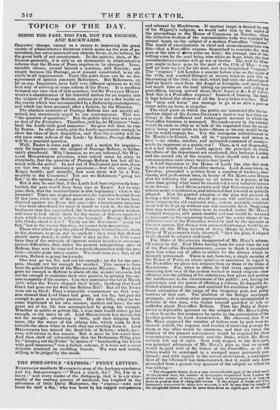TOPICS OF THE DAY.
GOING TOO FAST, TOO FAR, NOT FAR ENOUGH, AND BACKWARDS.
Ottoatstc change, except as a means to improving the great variety of administrative functions which make up the sum of go- vernment, has never possessed any charms for us, or, we believe, for the great bulk of our countrymen. In the opinion, then, of Re- formers generally, it is only as an obstruction to administrative reforms that the House of Peers requires to be changed. Innu- merable abuses, proved beyond a question, still flourish; and simply because the Peerage, as at present constituted, is an ob- stacle to all improvement. Upon this point there can be no dis- agreement of opinion amongst Reformers. But Reformers, or, let us say, Improvers, have held very different opinions as to the best way of arriving at some reform of the Peers. It is needless to repeat our own view of that question; but Sir WILLIAM MOLES WORTH'S abandonment of his intended motion for an inquiry into the subject of Peerage Reform, induces us to say a few words on the course which was recommended by a Reforming contemporary, and which has been pursued, after a fashion, by the Ministry.
The absolute necessity of Peerage Reform was not merely ad- mitted, but strenuously urged by our contemporary. This was "the question of questions." But the public mind was not as ripe as that of the Examiner. Therefore, said he, let Ministers " bom- bard the Lords with good measures:" the pear will then be ripe by Easter. In other words, give the Lords opportunity enough to show the vices of their disposition, and then the country will in- sist upon some reform of the Lords: by Easter, Peerage Reform *will be a practical question.
Well, Easter is come and gone; and a motion for inquiry— only for inquiry—into the subject of Peerage Reform, is delibe- rately abandoned. Why ? because, as we are informed, Sir Wit.- LIAM Motasswenertt perceives, what indeed must be plain to everybody, that the question of Peerage Reform has lost all in- terest with the public. In and out of Parliament just now, there are but two very interesting questions,—first the state of the King's health; and secondly, how soon there will be a Tory majority in the Commons! Yet are we Reformers "going too fast," in the opinion of some of us.
But it may be said that, if the Lords had been vigorously bom- barded, the pear wonN1 have been ripe at Easter. Let us sup- pose, then, that the bombardment is now beginning : what is the prospect? There are no good measures/or rejection beyond those of last year, while one of the great guns that was to have been directed against the Peers this year—the Church-rates measure —has been abandoned for want of hands to work it. As the bom- bardment time has approached, the besiegers have grown weaker, and have to look about them fir the means of defeilve against a force which is coming to relieve the besieged. Peerage Reform ! who thinks about it now ? Verily are the Reformers " going toe fast," but in the wrong direction, we cannot help susrecting.
Those who relied upon the plan of Peerage bonitntidment, want, in the abstract, to go as far us anybody : they wish that Refimn should move slowly, in order that it may go far. Su little sense have they of the necessity of vigorous motion in order to overcome serious difficulties, that, under the present retrograding state of Reform, they may be expected to console themselves with the pro- verb—reeuler pour mieux stutter. We Shall soon see; but, at all events, Reform is going baekwaids.
One may go too far, and not far enough ; too firr for one pur- pose, though not far enough for another. This seems to have been the grand blunder of the MELBOURNE Ministry. lthey have gone far enough in Reform to alarm all the sinister interests, but not far enough to maintain their own position by gaining the ear- nest sympathy of the masses. Can they remember the 1st of March 1831, when the Tories clapped their hands, thinking that Lord GREY had gone too far with the Reform Bill ? But all the Tories were not SO blind : Perm's miserable countenance on that occa- sion showed that Lord GREY had gone, not too far, but just far enough to gain a tenable position. His after folly, when he be- came frightened at his own success, matters not here; (ho one great act of his life was accomplished by going far enough. Whether in public or private life, a wise man would either go far enough, or not move at all. Lord MELBOURNE has moved, but not far enough; advancing a little, and then slipping back more, like the waves of the ebbing tide, which seem to flow towards the shore when in truth they are receding front it. Lord MELBOURNE has missed the fiood-tide of Reform ; which, how- ever, will return in due season. But it must be low-water first. And then shall all acknowledge that the Melbourne-Whig plan for" keeping out theTories" by means of "bombarding the Loids with good measures," was a foolish scheme, if it were not a mere delusion practised on confiding friends. We wait and watch, willing to be judged by the result.


























 Previous page
Previous page